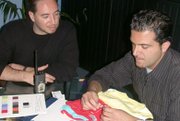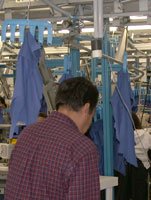The Journey to the Summit: Making T-shirts Different
Jerry Salem is not content to let things be.
The founder of Fountain Valley, Calif.-based manufacturer Summit Sportswear possesses a drive that constantly pushes him in the name of innovation. This drive is reflected in the setup of his company. Summit is a T-shirt manufacturer, contractor, fabric converter, and now, private-label manufacturer, thanks to a deal with Los Angeles-based Cartel Design Group (see sidebar, page 7).
Summit’s converting business is five years old, but the company recently began selling cut pieces—allowing clients as much control of the production process as they want.
“There are customers that don’t want us to make the pattern, or cut and sew the bodies to do finished shirts,” said Salem. “They are more hands-on; they are production people who want to save money. So we do the pattern and the marker, sell them the cut pieces, and they take the cut pieces and go to their sewing facilities, where they oversee the production to the end themselves.”
Summit currently has more than 200 employees in its main facility in Fountain Valley. That facility has grown to encompass three buildings but is still not large enough. According to Salem, plans are already in the works to move to a much larger facility in the very near future as the company continues to expand to meet the evolving needs of shirt manufacturing.
But it took 12 years to reach this point—and to create a niche in the T-shirt business.
Up until the early 1990s, manufacturing private-label T-shirts domestically was a difficult process that required buyers to limit their selection to a standard fit and standard fabrics, according to Salem.
Salem, who said that the T-shirt manufacturing process has been revolutionized by companies such as his, launched Summit in 1990. He said he saw a void in the T-shirt business after attending MAGIC International in Las Vegas with friends who were already making plans to create a clothing line.
“In 1990, you couldn’t get a basic tubular shirt private-labeled if you wanted to,” said Salem. “You would have to go to a distributor [to buy their product], go with their specs and slap on a screen print.”
Salem established contacts at the convention and set out to begin manufacturing T-shirts locally.
“I understand that with wovens and button-downs, you need to go to another country to make them, because it’s so expensive,” he said. “But everybody wears T-shirts and I couldn’t believe that people had a hard time getting T-shirts made [domestically].”
Salem began making T-shirt bodies—ready for custom printing—for such clients as Tommy Hilfiger. In order to get his company started and keep expenses down, he hired part-time employees who were at the top of their profession and could train and develop the team he built around them.
Several of those employees had been designers or buyers who had looked for a company like Summit, Salem said.
Summit grew rapidly—in part by acquiring other smaller companies—and began offering more services.
“When we started to grow, we used a couple of contractors and we were impressed,” said Salem. “We bought the facilities and made them our own because we liked the way they were run. A couple of companies that were much smaller and were startups, we acquired them as well.”
The deals worked out for everyone, Salem said, noting that Summit was able to rapidly expand its operations and the smaller companies could continue to offer the level of service to their customers while taking advantage of Summit’s resources and buying power.
And business was swift in the beginning, according to Salem, who said that the men’s T-shirt market was in its biggest growth spurt just as he entered the business.
“We got lucky,” said Salem. “The men’s market [then] was like the junior market [of today]. Now there are about a gazillion vendors for the men’s basic tubular T-shirt.”
Summit’s men’s business includes making tees for such Southern California labels as Hurley International, Quiksilver and Billabong.
Making the Jump to Junior
But as the market for men’s T-shirt manufacturing was reaching saturation seven years ago, Summit moved away from manufacturing the simple basic tubular men’s T-shirt and contracted with companies to produce specialty knit tops for juniors.
The junior business took off, said Salem, who counted as customers labels including Ana Sui, Pacific Sunwear and Levi’s.
“Whoever we sampled with became a customer,” he said.
But Salem soon discovered a key difference between making a men’s T-shirt and a junior tee: fit.
“The designers for men’s are much more interested in the graphics, or maybe a cool panel or reverse cover stitch,” he said. “The designers for women’s are much more psychotic about fit—especially when you get into the fancier fabrics like poly/rayon or cotton/Lycra. They will have us adjust something for a quarter-inch chest measurement on the flap.”
Salem said the switch to the junior market marked a sharp growth in Summit’s business and—initially—the growth was unsettling.
“We would get orders and it would scare the fabric department and the production team,” he said. “But those orders educated us, and we [knew we needed] to go and hire the right people.”
Today, Salem counts clients including Mervyn’s, Levi’s, Disney, Polo and Lands’ End as some of the most challenging for Summit because of their specific fit specs and because they tend to use such blends as poly/rayon, poly/rayon/Lycra and cotton/Lycra.
Summit meets the needs of those clients with more than 100 sewing machines and such technologies as the CAD [Computer Aided Design] System and automatic spreading and automatic cutting machines. The company also uses a Robotics Unit Production System made by Tukatech, which carries each unit along an assembly line of sewers. The system allows Summit to check on a completed garment before all the cut pieces are sewn.
All this technology has been well worth the investment, according to Salem.
“The benefit is that we become much more valuable to our customers,” he said.
New Deal Takes Tees From Concept to Completion
Summit Sportswear’s latest endeavor is a partnership agreement with Cartel Design Group to offer full-package graphic tees to manufacturers and retailers.
“Jerry’s already doing the blank tee—I can do the design and the merchandising,” said Anthony Quiroz, owner of Cartel. “We merge everything together and the customer comes to one place.”
Quiroz said that customers find satisfaction with the partnership between Summit and Cartel because of the companies’ focus on problem solving.
“It’s the quality, the customer service and the communication that determines how difficult [the project] is,” said Quiroz. “You’re always going to have problems even if you’re making the most basic T-shirt with one color.”
Summit and Cartel’s first joint venture is a servicing of Westlake Village, Calif.-based K-Swiss, shipping the fabric for the athletic shoe giant’s foray into updated athletic apparel.























